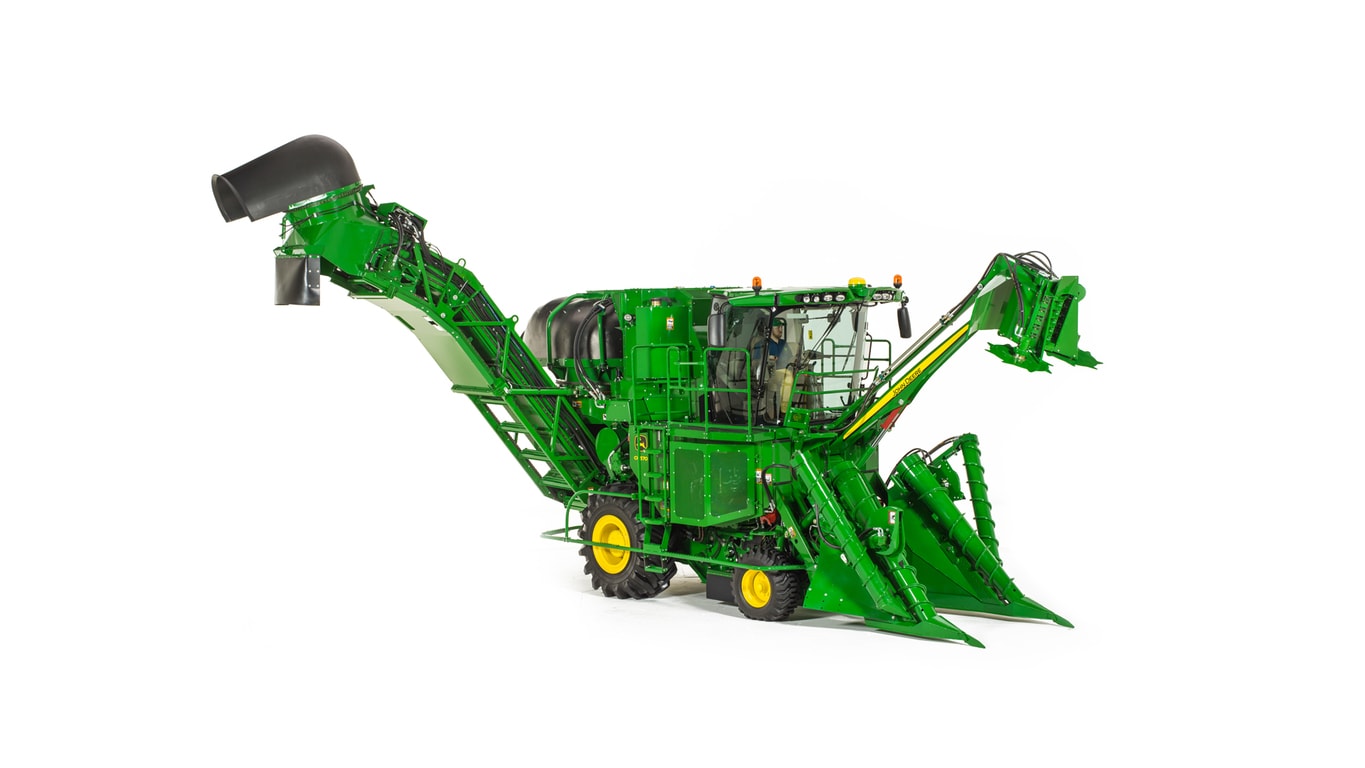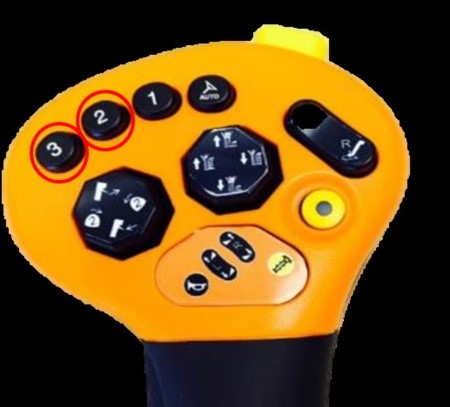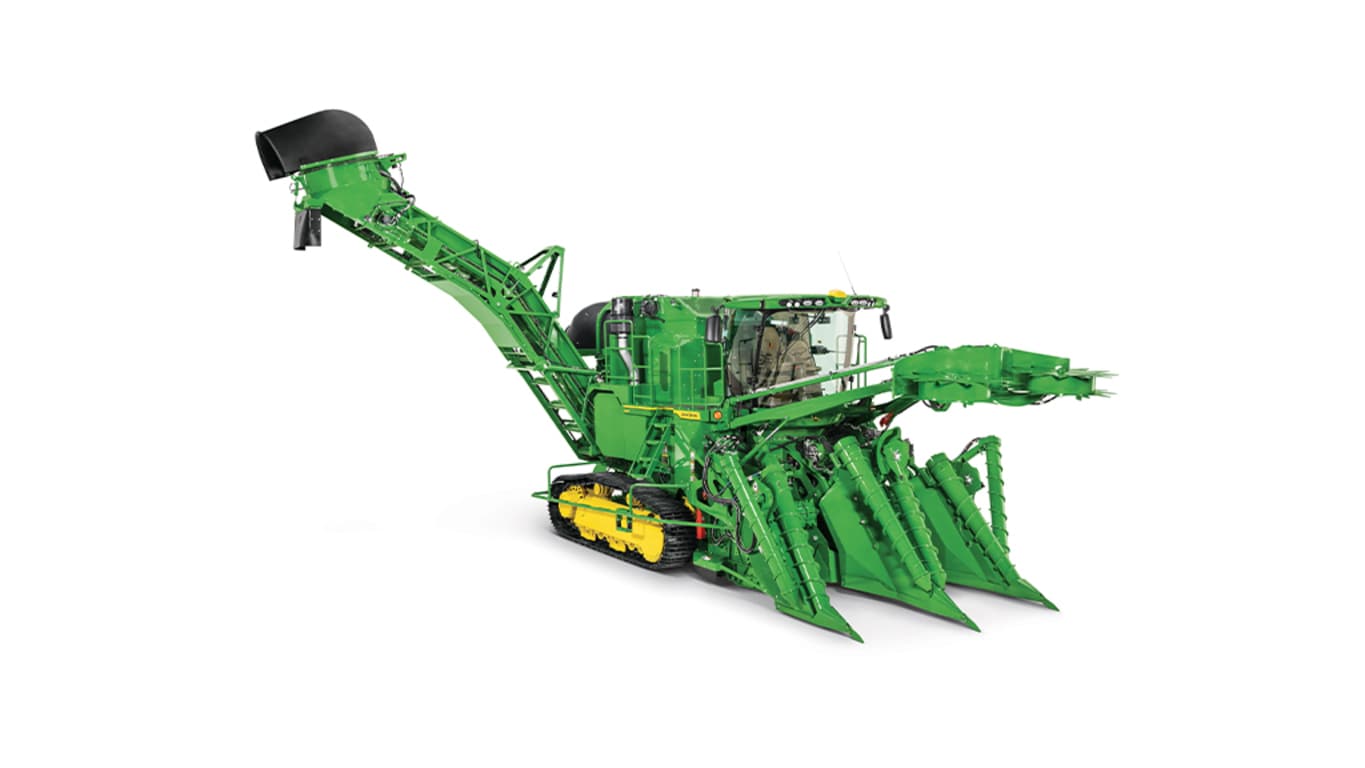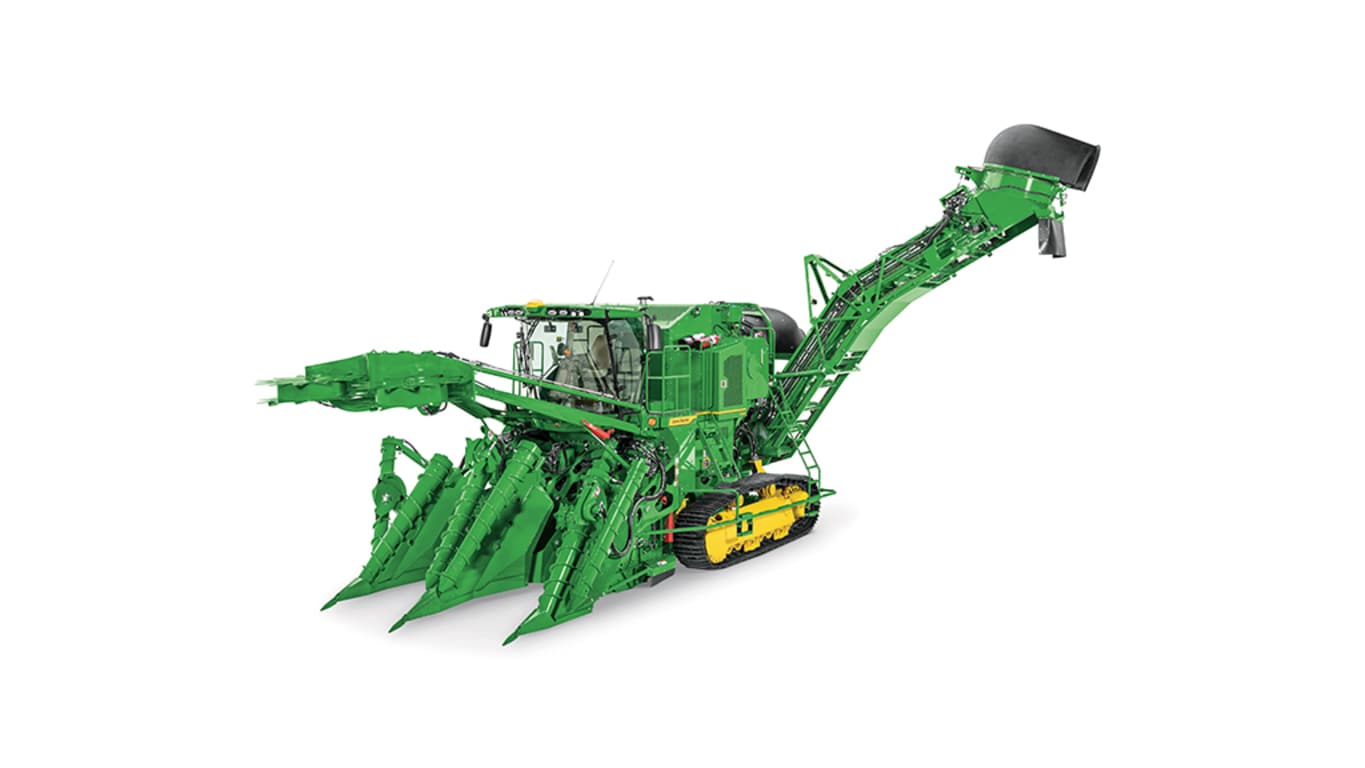On-screen monitoring, logging, and performance mapping
 Exclusive John Deere technology
Exclusive John Deere technology
 Data-driven decisions
Data-driven decisions
Harvest Monitor is an industry-exclusive technology from John Deere. Harvest Monitor gathers and analyzes valuable harvest information, enabling sugarcane producers to make smarter decisions that drive down harvesting costs and improve overall farming practices.
From the cab, the operator can monitor total tons harvested, harvester productivity, trash percentage, and fuel consumption. The operator can then use this information to make on-the-fly adjustments to optimize performance.
SmartClean is the latest enhancement of Harvest Monitor that allows automatic control of primary extractor fan speed based on the operator’s preferences in order to obtain the most profitable balance between cane cleanliness and reduced loss.
Through the John Deere Operations Center, the data can be processed to generate yield and other valuable maps and reports that will guide producers into making the right decisions on soil and water management, chemical application, crop renewal, field layout, equipment logistics, and much more.
Harvest Monitor with SmartClean is available as an option for CH570 and CH670 Sugar Cane Harvesters as part of Cane Advisor™ machine optimization technology package (code 2904). It can also be purchased as a field-installed kit for all CH570 and CH670 models. A separate SmartClean field-installed kit is available for CH570 and CH670 models already equipped with Harvest Monitor.
Harvest Monitor features
 Harvest Monitor installed on a CH570
Harvest Monitor installed on a CH570
Harvest Monitor is much more than just a yield monitor. It includes:
- Optical yield monitor
- Elevator optical extraneous matter (trash) monitor
- Primary extractor cane loss monitor
- Primary extractor residue (trash) discharge monitor
- Fuel per ton monitor
- Pour-rate monitor
- Elevation monitor
- Transport load counter
Harvest Monitor was designed to operate efficiently in all weather conditions. It is a low maintenance system with no additional wear items thanks to its optical technology that does not require direct contact with the cane.
Optical yield and trash monitor technology
 Harvest Monitor
Harvest Monitor
High-resolution, stereoscopic optical sensors and pattern recognition technology are used to scan the flow of cane as it passes through the elevator, identifying cane volume and differentiating it from trash. Four light-emitting diode (LED) lights illuminate the sampling area to ensure uninterrupted visual clarity.
 Flow of cane being scanned
Flow of cane being scanned
 Image recognition
Image recognition
The system converts the volumes to mass in order to obtain tons of cane and extraneous matter level.
SmartClean system, an intelligent way of cleaning cane
 SmartClean illustration
SmartClean illustration
With the use of sensors, the SmartClean system detects cane being lost through the primary extractor and displays it on the CommandCenter screen as an index. The level of residue or cane leaves being removed is also detected and displayed as an index.
Aiming at the best economic outcome for the operation, the operator selects the target level of the following parameters and lets the system continuously and automatically find the appropriate primary extractor fan speed:
- Elevator extraneous matter (trash)
- Primary extractor cane loss
- Primary extractor residue discharge
SmartClean enables operational consistency throughout the day regardless of weather conditions and individual operator practices.
Understanding the residue level is important for biomass power generation projects to determine residue collection logistics and viability.
Georeferenced data
 StarFire™ Receiver
StarFire™ Receiver
 Sugar cane field yield map
Sugar cane field yield map
Data points are georeferenced to precise field locations using global positioning system (GPS) technology. With appropriate software, a variety of informative maps can be generated. The system operation requires a GPS receiver.
On-screen monitoring
 Home page showing Harvest Monitor information (left hand) and video (right hand)
Home page showing Harvest Monitor information (left hand) and video (right hand)
While harvesting, the display will show:
- Harvester pour rate (ton/h)
- Extraneous matter (trash percentage)
- Primary extractor cane loss (index)
- Primary extractor residue discharge (index)
- Fuel consumption (L/ton or gal./ton)
- Yield (ton/ha or ton/acre)
- Transport load count
- Live elevator cane flow video
The CommandCenter display layout is configurable so the operator can have Harvest Monitor and SmartClean displayed together on the same screen.
Average, best, and current values of extraneous matter, fuel consumption, and pour rate are displayed instantaneously or as historical figures. Also available on the display is a summary report of all data.
Pour rate is defined as how fast the cane flows through the machine and is measured in tons per hour (ton/h). A soft key enables the operator to toggle between elevator hours (elevator pour rate) and total harvester hours (harvester pour rate). This soft key also changes the reading of fuel consumption using either elevator or total harvester hours.
A yield map can also be seen on the display, as well as live video of cane as it flows through the elevator.
Transport load counter
To keep records of the number of wagons completed, the operator will click the “Save Load” soft key every time a unit is loaded. The screen will show the total loads from a field, shift, whole season, or another preselected period of time. The sugar mill destination can also be recorded for each load.
Data-driven smart decisions on the go
 CH570 operating in the field
CH570 operating in the field
With SmartClean activated and based on live information, the operator can make other quick adjustments to the harvester, like ground speed and FieldCruise™ settings, to maintain the most profitable harvesting rate while delivering the preferred level of cane quality and reduced loss.
 Primary extractor fan blades
Primary extractor fan blades
 Chopper blades
Chopper blades
The system will also help to determine when the chopper and extractor fan blades need to be replaced, or if other related service is required in order to maintain optimum operating performance.
 In-field equipment transloading into highway trucks
In-field equipment transloading into highway trucks
 Multiple harvesters
Multiple harvesters
The live yield data simplifies daily logistics decisions, including the number of transport units required and the correct timing to efficiently complete the assigned cane quota. In addition, field harvesting progress and remaining unharvested area can be seen on the screen for a great visual of the operation that can facilitate the transition to the next field.
Elevation monitor
 Surveying the field while harvesting
Surveying the field while harvesting
 Map showing low and high areas
Map showing low and high areas
Georeferenced samples that include elevation readings are taken every second. As the harvester travels down each row, numerous elevation readings representing the topography of the area harvested are recorded.
Example of a typical field:
- Row spacing: 1.5 m (4.9 ft)
- Operating speed: 5.4 km/h (3.4 mph)
- Readings per hectare: 4,444
- Represented area: 1.5 m by 1.5 m (4.9 ft by 4.9 ft)
Mapping and data management
 Generated maps
Generated maps
 Decisions on agronomical practices and logistics
Decisions on agronomical practices and logistics
The Harvest Monitor data can be processed through John Deere’s Operations Center to generate maps and reports that will help optimize operations.
Different types of maps can be created for a clear visualization of current farm conditions:
- Yield variability
- Harvester productivity
- Fuel consumption
- Extraneous matter
- Field elevation
Examples of generated maps
 Crop yield map
Crop yield map
 Yield contour map
Yield contour map
 Extraneous matter (trash) map
Extraneous matter (trash) map
 Harvester speed map
Harvester speed map
 Field elevation map
Field elevation map
The maps and reports will help to determine the best solutions for:
- Chemical application
- Water management
- Cultivating practices
- Gap planting
- Crop renewal
- Variety selection and performance
- Seed rate
- Land leveling
- Field layout
- Equipment operation management
- Logistics
Information can also be used to evaluate results of previously implemented solutions to make adjustments if needed.
Calibration
 CH570 working with weigh wagon
CH570 working with weigh wagon
During harvesting, Harvest Monitor can be calibrated manually by entering weight information for the load supplied by the mill.
The maps can also be calibrated using field report data supplied from the sugar mill.
Google Earth is a trademark of Google LLC.




































































